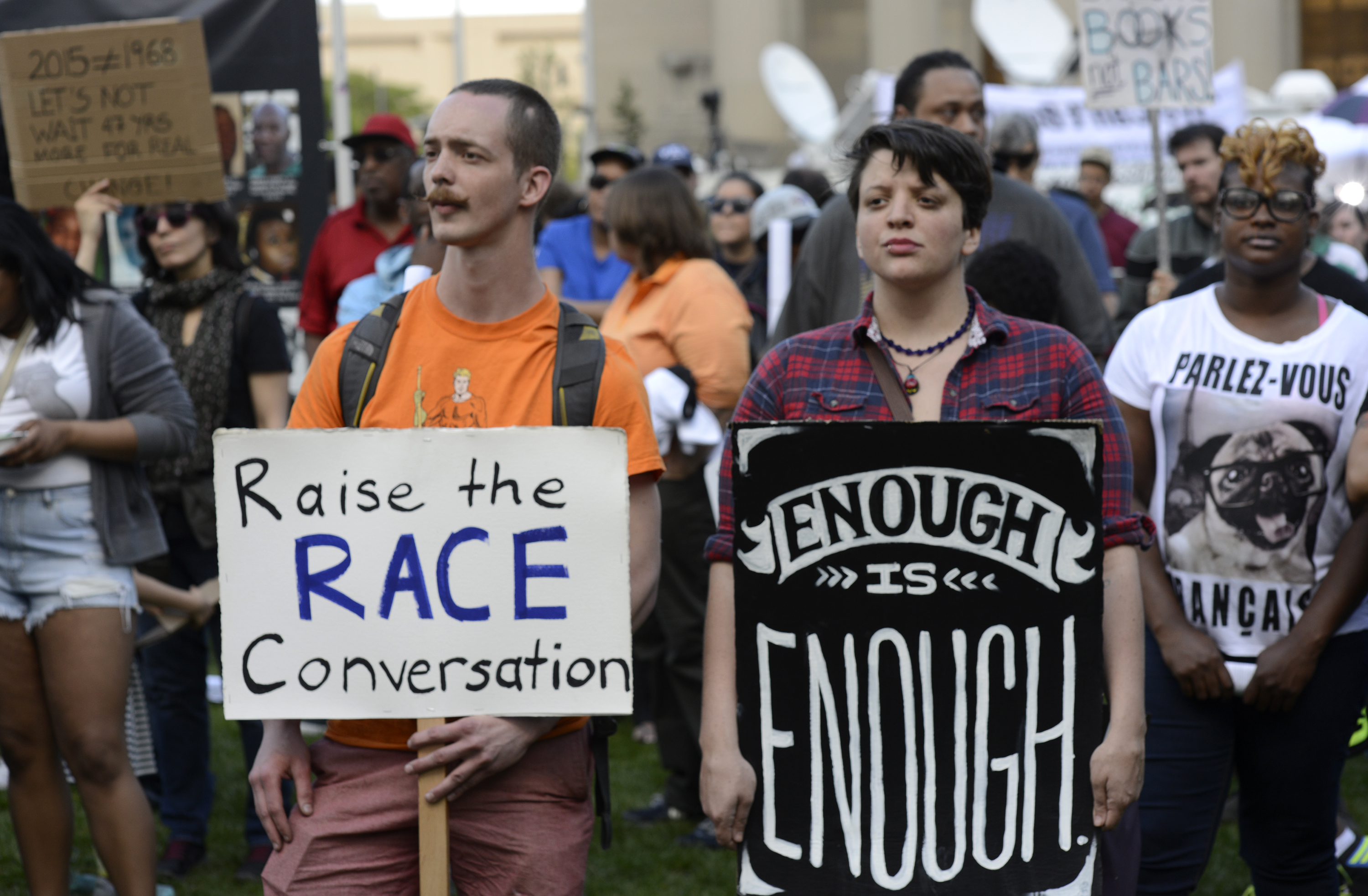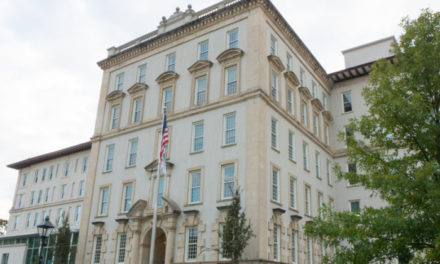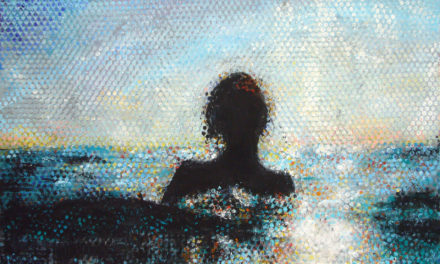“And the notion that black lives, black bodies and black wealth were rightful targets remained deeply rooted in the broader society,” writes Ta-Nehisi Coates, in the Atlantic article “The Case for Reparations.” Coates has a way with words that is truly magical, and in that article, he outlines the history of the black race in America and shows through many pieces of evidence, each more staggering than the last, the ways that black people have been systematically oppressed, trampled on and stifled throughout American history.
He presents a perspective on life, America and history that is divergent from the perspective I was raised on. It is a weird, difficult feeling for modern affluent white people to deal with the atrocities committed by their race before they were born and in our modern time. They do not feel connected to such disparate events; they are stuck in their world, in their perspective. Those who are blessed with the gift of natural true understanding are few and far between; the majority of people interpret the world through the lens with which they were born, the same lens that their parents and grandparents saw the world through.
It is through that lens that I and my fellow white students read the list of demands, published by the Black Students of Emory University (I believe that this is a colloquialism, and not every black student at Emory was consulted prior to the publishing of this list of demands). The list of demands is angry, unwavering and, at times, uses language that is very forceful. In some instances, the demands are not backed up with strong evidentiary support, and they are not as well researched as they could have been.
They are the result of the incredible pain felt by black Americans, a pain that my fellow white Americans and I have great difficulty understanding on even an academic level, let alone on an emotional level. The demands call for far-reaching changes to the way Emory University operates, and they sometimes seem unfair or impossible. They also threaten the school, using language such as, “If we do not receive a response, and our demands are not met, we will take appropriate nonviolent actions which will escalate until our demands are met.”
This is a nonviolent threat, but a threat nonetheless — do what we say, or you will face the consequences. I am aware of the justification that threats are allowed when your race has been oppressed for generations, but do keep in mind, an eye for an eye makes the world go blind.
As the new generation of this country, it is our unwavering responsibility for every single one of us to change behavior that leads to further misunderstanding and tension. In a world full of soldiers, war is always the answer, and a society at war with itself cannot survive — so we must not think as soldiers, but as ambassadors and diplomats. We must be the change we wish to see in America, or the racial strife and injustice that has dominated our history will never be left behind. We must engage others in dialogue, not lecture each other on why we are right. We must treat every fellow human with respect and care, appealing to their sense of rationality and their desire to see justice.
To the authors of the list of demands: I believe you have made many excellent suggestions, and your intentions could not be more pure. I was glad to see such a well-written response from Senior Vice President and Dean of Campus Life Ajay Nair, which demonstrates that the University also believes your claims as noteworthy. But I believe that using aggressive and accusatory language will never foster a spirit of understanding in your fellow Emory students.
People do not respond well to being threatened or manhandled. Your anger, your pain — they are both justifiable and understandable. I am aware that writing a list of suggestions has nowhere near the same impact as writing a list of demands. But I believe that your ultimate goal is mutual understanding, and understanding can never be achieved without dialogue and discussion. For dialogue and discussion to occur, people’s minds must be truly opened. Using aggressive language with your administration and fellow students is a quick way to close their minds, to ensure that they remain locked in their born perspective, a prison that even the most thoughtful among us have trouble escaping. The ease with which people stop listening is not justified, it is not fair, but it is the reality of the way that human beings tick, a reality that has been proven and reinforced in innumerable conflicts throughout our tumultuous history as a species.
Over the course of my many years of dialogue, clear communication and inclusivity, I have become aware of the brutal injustices the black race has suffered throughout American history, though my understanding of those injustices is a horizon I can only move closer toward and never truly reach. I am fortunate enough to have family who pushed me toward open-mindedness and critical thought. I was lucky enough to have had friends in high school who were patient, understanding and willing to communicate their station in life with me, even though I appeared ignorant and insensitive to them. I look forward to a lifetime of building on and expanding this awareness.
I think the most powerful suggestion that the Black Students of Emory gave and one that I most hope the school acts on, is requiring a GER on the topic of diversity and blackness in America. My brother told me a story, in which he and a fraternity brother signed up for an African American Studies class together. His fraternity brother felt out of place and withdrew from the class. But my brother stayed, and he expressed how meaningful and valuable of an experience the class was. He described it as truly eye-opening, the sort of eye-opening that makes you question everything you’ve ever read, seen or heard, the sort of eye-opening that leaves you with the feeling that you are a changed person and forever will be.
Educating the ignorant is an extremely difficult task. A closed mind is likely to stay that way, especially if it is simply told it is wrong. Through dialogue, discussion and meaningful communication, the barriers of race can be brought down, and a brighter future for all can be constructed.
Duncan is a Junior from Seattle, Washington.







A GER on blackness? Really?
You do realize that diversity means more than just blackness…
It said diversity AND blackness (there was no equivalence of the two being made. You got into Emory, you surely no how to read critically and not read things that are not there)……there are many classes that either exist now or could be created to provide that outlet (even if it is a class on presidential elections or basic US politics, the plight of various groups in America and how they tend to mobilize and vote would be covered in the context of their treatment in America). And honestly, many public universities (such as those in Georgia) already require courses in US History which no doubt will encompass such issues in great detail. He was using an African American Studies class his brother took as an anecdote. If it were merely to be courses on blackness alone, resources on the departments offering such courses would be stretched far too thin. This logic is also what got rid of the more challenging set of GERs that existed before 2008. They were far too narrow (and I think they may have even included a GER similar to the one being requested….something on citizenship or something) and led to undesired high enrollment numbers in several departments that could not handle it. Think before you write and extrapolate something that is clearly not there.
Are you really trying to correct my critical reading skills when you misspelled “know” as “no?” That is laughable.
Proofread next time before you you click that “post as anon” button at the lower right bottom of the text box.
He said “diversity and blackness.” He singled out blackness as if it were something special. Had he simply said “diversity” and left the “blackness” out then it would be more inclusive.
Are you a BSA member by any chance?
No, I have never been a part of that….I am an alum. And yes, he singled out the blackness to highlight the interesting experience of his brother which is an experience he could readily call on to discuss. The anecdote, whether true or not, was quite interesting and made interesting points. The other fraternity brother being uncomfortable or unwilling to engage was quite telling and shows how uncomfortable many are with discussing these issues (especially with those who come from a different point of view).
It was much like how a male would withdraw from a Women and Gender Studies course. People should just be willing to learn about whatever and engage others with different ideas even if they are not immediately comfortable with it. The concept of students of different backgrounds being able and willing to engage challenging and difficult concepts and issues that effect society along with the people affected by them is what sparks great ideas and does open minds. It is also what makes the intellectual environment at some elite universities great and others (such as Emory) well…..loaded with potential, but still lacking. We have the diversity and brain-power, we just need to be a little less uncomfortable and risk averse about these things.
He singled out blackness. Stop making excuses. He could have and should have simply said “diversity.” By singling out blackness as something distinct from diversity, he doesn’t lump blackness together with equality. Equality for everyone isn’t being argued there, but rather it is black privileged that is being argued since blackness is something that is different and special than diversity.
The fraternity brother “Felt out of place.”
This does not necessary mean he was uncomfortable with discussing the issues. You make the assumption that it is the fault of the fraternity brother for feeling out out place. Perhaps it was the class or professor making the fraternity brother to feel uncomfortable.
Once again with the example of the male withdrawing from a Women and Gender Studies course, you make the assumption that the male acted out of free will. There are many explanations for why that happened. Perhaps the class and professor were being “micro aggressive” towards him.
Emory cost 200 grand. If you choose to see that as directed toward you then call it a microagression and keep it moving lol. But I just meant it in general. I’m saying that Emory students need to toughen up and talk it up. That is the point I am making. And is half of the point this article is making. I personally paid nothing than for the summer I took courses because I had Emory advantage, but I treated my education as if it were worth 200 grand as everyone should. Emory claims it is worth that much, but it is up to us to make that so (if possible-highered expenses are out of control. Most of the cost is so that we enjoy awesome amenities and be able to distract ourselves from learning).
I’m going to take another page from the social justice warriors book of tactics. I feel offended. You used micro aggression towards me. You should check your privilege and resign immediately. The President of Emory and the US should also compensate me for the damages you caused upon me. The court should pay me $1 trillion for the emotional distress.
Nowhere in his article, or in any of the BSA demands did they ever say anything in supportive of Asians, Hispanics, Sikhs, Buddhists, Muslims, Jews, etc….Supporting one group over others is not equality. Supporting one group over others is privilege,
Good, be offended, that has nothing to do with me. It is their demands and of course they emphasized themselves:
However, just like this non-minority writer, they didn’t equate diversity to blackness:Emory University does not currently have a General Education Requirement that focuses specifically on the histories and experiences of people of color” The GER suggestions were 1) Consider creating a Global Citizenship & Diversity General
Education Requirement and 2) Expand the range and quantity of course offerings specifically related to race relations, racism, ethnicity, etc .
Their demands were naturally African American centric, but they did recognize (as displayed in demand 13) that the two don’t equate (and also suggested that people of color does not equal black(, no matter how “militant” (I mainly refer to the combative and hyperbolic descriptions and languages being used) the other demands were. Also, while I don’t care for the language (and even several of the demands) in the document, let us please not pretend that self-centeredness is not uncommon for any group, especially ethnic minorities of any kind, calling attention to themselves. I would basically have to sit around and be offended by every movement or lobbying effort by every ethic minority in America. Their goals, when written out, are usually very targeted and do not refer to others. I suppose we are all committing micro-agressions against each other, much as did the founding fathers when writing the constitution. Not much mention of native Americans, slaves, and women in it. Of course the actual aggression comes from ethnic minorities’ treatment more so than whether or not they were explicitly mentioned in a document.
Cute…they are a student